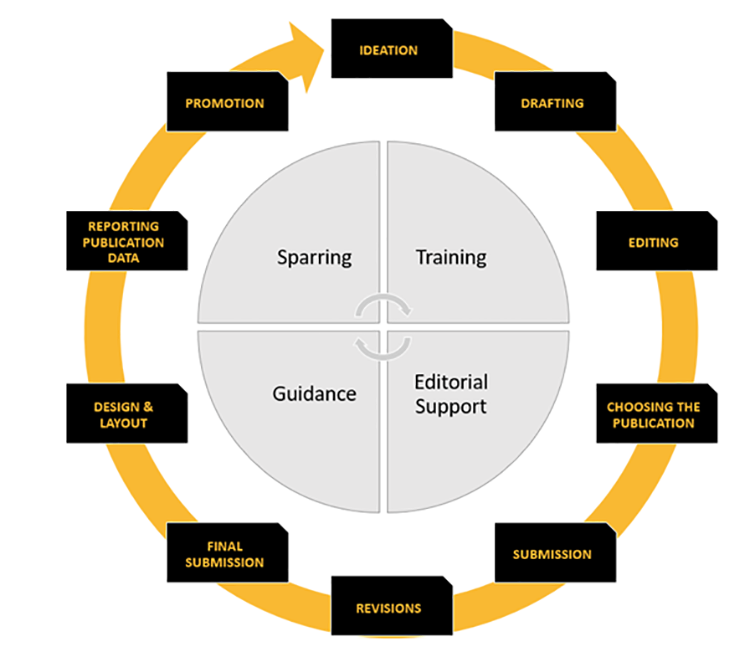Publish and Prosper: Supporting a Writer’s Professional Development
14.12.2021It’s time to rethink the support structures of scientific and professional writing, so that writers can publish and prosper, rather than publish and perish.
A new unit to support an open research culture
South-Eastern Finland University of Applied Sciences – Xamk promotes an open research culture. This naturally concerns RDI activities, but also all produced information and competences of all researchers, project actors, teachers, and personnel.
Xamk aims to increase both the quantity and quality of our scientific and professional publications, and encourages all staff to participate in publishing activities. This goal was recently set out in a report evaluating the future potential of Xamk and Häme University of Applied Sciences (Hamk) in the international scene (Sirén 2021).
At the beginning of 2021, all publishing processes were centralized into one new unit: Publication and Production Services. To help our staff produce high impact publications, we are creating new support structures to promote a healthier, sustainable approach to publishing and facilitate the development of our writers’ professional identities.Publishing is a core part of a researcher’s professional identity
The quantity of scientific and professional publications matters a great deal in research institutions. The Ministry of Education and Culture collects publication data from higher education institutions to monitor research activities and the social impact of the Finnish research system. Based on this data, research funding is allocated accordingly.
Publishing plays such an important part in one’s professional career.
The burden of publishing is often passed directly onto the researchers who are under pressure to write and publish prolifically, so much so that the expression “publish or perish” was coined (Garfield 1996). At times, it might seem that the only thing that matters is to publish, regardless of the quality.
Publishing plays such an important part in one’s professional career because it is often a key measure of a project’s success for funders and it also facilitates knowledge exchange between researchers, while providing a way of participating in the broader professional and scientific community. However, if the focus is solely on quantity rather than quality, then the concern is that this will lead to a negative socialisation in the workplace as well as feelings of inadequacy, imposter syndrome, and self-doubt (Boyd & Smith, 2016)
As such, there is a need to support researchers throughout their writing and publishing processes, while helping to develop their professional identity to enable a more sustainable approach to publishing, that is not only focused on the volume of publications produced.
But what is a researcher’s professional identity?
Our understanding of researcher identity is based on the notion of dynamism, Castelló et al. (2021) explain that “dynamism and movement of identities is consistent with the constant changes researchers face nowadays. This dynamism is related to three different characteristics: transitions, development and fluidity”.
However, the term “researcher’s identity” is too limiting, and as such, we use the term “writer’s identity”. This is because increasingly at higher education institutions, it is not just researchers that publish, but also teachers, administrative staff, project workers, and other higher education professionals who have knowledge that they can pass onto the professional community (Boyd & Smith, 2016).
As Boyd & Smith (2016) highlight however, universities need to be aware of the pressure that unwritten rules can exert on staff, such as the demand for publishing and research activity. They warn that without reasonable expectations, clear guidelines and support, and positive identity role models in the field, it will be difficult to manage their workload and prioritise effectively. While this can have a negative impact on a writer’s productivity, more importantly it can contribute to a poor socialisation into their field and hinder the development of their professional identity.
Supporting the Positive Socialization of Writers
Taking onboard these findings, we have identified key areas where we can support the development of our staffs’ professional identity through positive socialization and publishing-related support structures. We offer sparring sessions, training courses, editorial support, and guidance for all staff who are producing publications.
Rather than providing editorial support when a manuscript is ready for review, we are introducing support structures throughout the entire publishing process. In this way, we move from the old practice of proofreading finished manuscripts, and instead offer writers the possibility to get meaningful feedback on their publication ideas, early drafts, advice on where to publish, and help with promoting their publication.
A key element of our guidance work naturally focuses on publication data, which can be openly viewed in the JUULI data portal and Research.fi. In the future, Research.fi will be a forum to showcase the professional profile of researchers and writers, their chosen affiliations, research activities, and publications.
It will become necessary to have an online presence of one’s research and publication activities – to facilitate networking and knowledge exchange with other researchers nationally and internationally. Reflecting on one’s own professional identity will be crucial in profiling oneself online to make use of the new tools effectively.
By taking on a dynamic role in the publishing process, writers can explain what type of support they need and what guidance would be most beneficial for them. We cannot continue the old unsustainable system of editing manuscripts, without an active dialogue between all parties involved, and a clear division of roles and responsibilities between the editors and the writers (Pienimäki 2020). This is no longer a beneficial model for the development of a writer’s professional identity and does not support the advancement of their writing skills.
Through these new support structures, we aim to remove as many barriers to publishing as possible, make any unwritten rules visible, and support the development of all our writers’ professional development.
We hope that the guidance we offer will provide the necessary tools for our staff to be positively socialized into the broader professional and scientific community, and be healthy, happier writers.
References
Boyd, Pete and Smith, Caroline (2016) The contemporary academic: orientation towards research work and researcher identity of higher education lecturers in the health professions. Studies in Higher Education, 41 (4). pp. 678-695.
Castelló, Montserrat & McAlpine, Lynn & Sala-Bubaré, Anna & Inouye, Kelsey & Skakni, Isabelle. (2021). What perspectives underlie ‘researcher identity’? A review of two decades of empirical studies. Higher Education. 81. 10.1007/s10734-020-00557-8.
Garfield, Eugene The Scientist 1996 “What Is The Primordial Reference For The Phrase ’Publish Or Perish’?” https://www.the-scientist.com/commentary/what-is-the-primordial-reference-for-the-phrase-publish-or-perish-57976
https://research.fi/en/service-info
Pienimäki, Hanna-Mari. (2020). The role of language professionals in international academic publishing. Available: https://vastuullinentiede.fi/en/publishing/role-language-professionals-international-academic-publishing
Sirén, Hannu. (2021). Yhteistyöllä osaamista, aluekehitystä ja kansainvälisyyttä. Xamk Kehittää 157. Mikkeli: Kaakkois-Suomen ammattikorkeakoulu. PDF document. Available: https://urn.fi/URN:ISBN:978-952-344-351-8

































